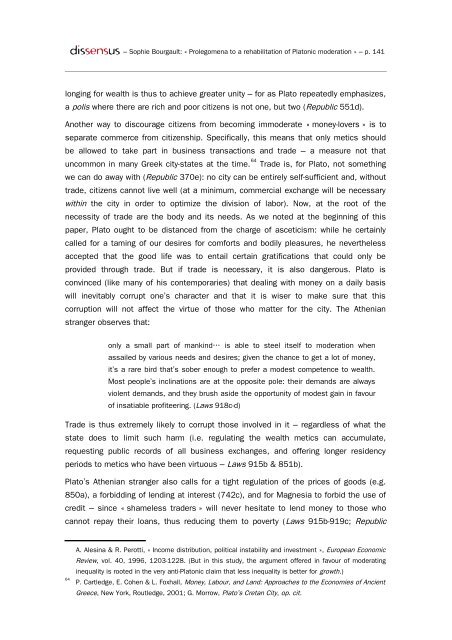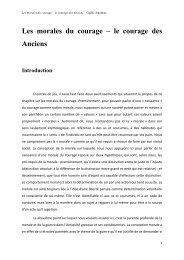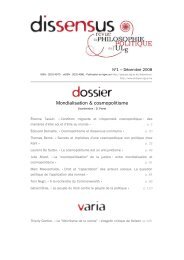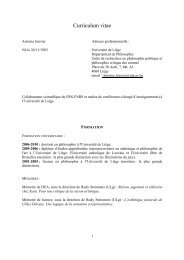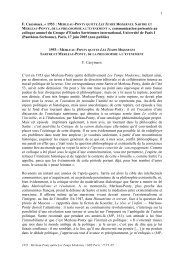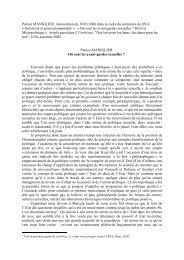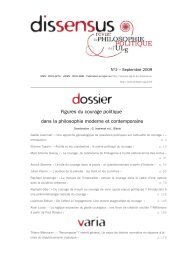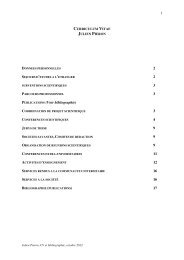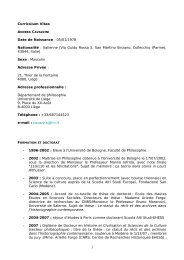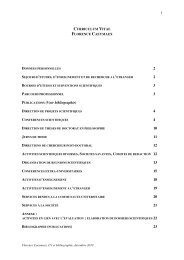Subjectivations politiques et économie des savoirs - Service de ...
Subjectivations politiques et économie des savoirs - Service de ...
Subjectivations politiques et économie des savoirs - Service de ...
Create successful ePaper yourself
Turn your PDF publications into a flip-book with our unique Google optimized e-Paper software.
– Sophie Bourgault: « Prolegomena to a rehabilitation of Platonic mo<strong>de</strong>ration » – p. 141<br />
longing for wealth is thus to achieve greater unity – for as Plato repeatedly emphasizes,<br />
a polis where there are rich and poor citizens is not one, but two (Republic 551d).<br />
Another way to discourage citizens from becoming immo<strong>de</strong>rate « money-lovers » is to<br />
separate commerce from citizenship. Specifically, this means that only m<strong>et</strong>ics should<br />
be allowed to take part in business transactions and tra<strong>de</strong> – a measure not that<br />
uncommon in many Greek city-states at the time. 64 Tra<strong>de</strong> is, for Plato, not som<strong>et</strong>hing<br />
we can do away with (Republic 370e): no city can be entirely self-sufficient and, without<br />
tra<strong>de</strong>, citizens cannot live well (at a minimum, commercial exchange will be necessary<br />
within the city in or<strong>de</strong>r to optimize the division of labor). Now, at the root of the<br />
necessity of tra<strong>de</strong> are the body and its needs. As we noted at the beginning of this<br />
paper, Plato ought to be distanced from the charge of asc<strong>et</strong>icism: while he certainly<br />
called for a taming of our <strong><strong>de</strong>s</strong>ires for comforts and bodily pleasures, he nevertheless<br />
accepted that the good life was to entail certain gratifications that could only be<br />
provi<strong>de</strong>d through tra<strong>de</strong>. But if tra<strong>de</strong> is necessary, it is also dangerous. Plato is<br />
convinced (like many of his contemporaries) that <strong>de</strong>aling with money on a daily basis<br />
will inevitably corrupt one’s character and that it is wiser to make sure that this<br />
corruption will not affect the virtue of those who matter for the city. The Athenian<br />
stranger observes that:<br />
only a small part of mankind… is able to steel itself to mo<strong>de</strong>ration when<br />
assailed by various needs and <strong><strong>de</strong>s</strong>ires; given the chance to g<strong>et</strong> a lot of money,<br />
it’s a rare bird that’s sober enough to prefer a mo<strong><strong>de</strong>s</strong>t comp<strong>et</strong>ence to wealth.<br />
Most people’s inclinations are at the opposite pole: their <strong>de</strong>mands are always<br />
violent <strong>de</strong>mands, and they brush asi<strong>de</strong> the opportunity of mo<strong><strong>de</strong>s</strong>t gain in favour<br />
of insatiable profiteering. (Laws 918c-d)<br />
Tra<strong>de</strong> is thus extremely likely to corrupt those involved in it – regardless of what the<br />
state does to limit such harm (i.e. regulating the wealth m<strong>et</strong>ics can accumulate,<br />
requesting public records of all business exchanges, and offering longer resi<strong>de</strong>ncy<br />
periods to m<strong>et</strong>ics who have been virtuous – Laws 915b & 851b).<br />
Plato’s Athenian stranger also calls for a tight regulation of the prices of goods (e.g.<br />
850a), a forbidding of lending at interest (742c), and for Magnesia to forbid the use of<br />
credit – since « shameless tra<strong>de</strong>rs » will never hesitate to lend money to those who<br />
cannot repay their loans, thus reducing them to poverty (Laws 915b-919c; Republic<br />
64<br />
A. Alesina & R. Perotti, « Income distribution, political instability and investment », European Economic<br />
Review, vol. 40, 1996, 1203-1228. (But in this study, the argument offered in favour of mo<strong>de</strong>rating<br />
inequality is rooted in the very anti-Platonic claim that less inequality is b<strong>et</strong>ter for growth.)<br />
P. Cartledge, E. Cohen & L. Foxhall, Money, Labour, and Land: Approaches to the Economies of Ancient<br />
Greece, New York, Routledge, 2001; G. Morrow, Plato’s Cr<strong>et</strong>an City, op. cit.


